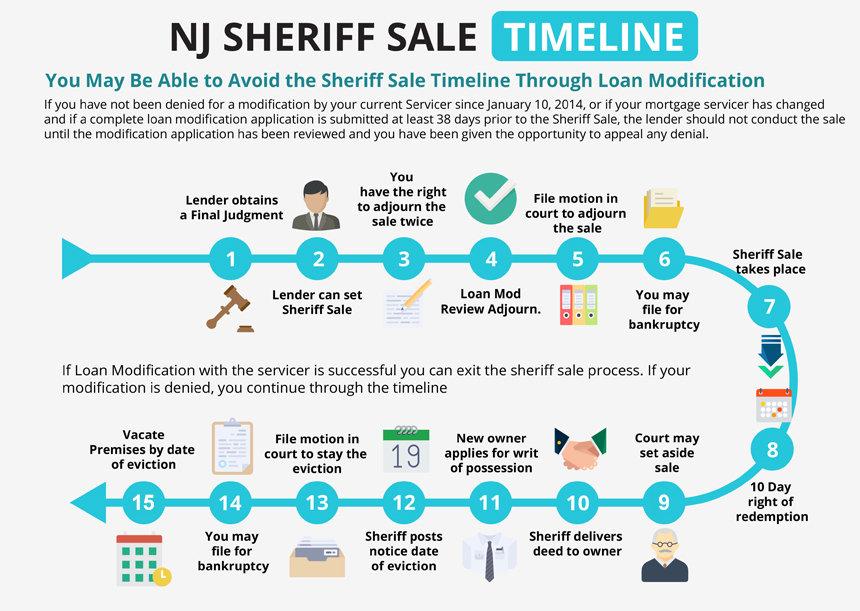Click the Visual Timeline to Zoom in.
Although every case is different, below is a general timeline of Sheriff Sale Process in New Jersey:
Table of Contents
- 1. Lender Obtains a Final Judgment
- 2. Lender Can Set Sheriff Sale
- 3. You Have The Right to Adjourn the Sale Twice
- 4. Loan Mod Review Adjourn.
- 5. File Motion in Court to Adjourn the Sale
- 6. You May File For Bankruptcy
- 7. Sheriff Sales Takes Place
- 8. 10 Day Right of Redemption
- 9. Court May Set Aside Sale
- 10. Sheriff Delivers Deed to Owner
- 11. New Owner Applies for Writ of Possession
- 12. Sheriff Posts Notice Date of Eviction
- 13. File Motion in Court to Stay the Eviction
- 14. You May File For Bankruptcy
- 15. Vacate Premises by Date of Eviction
1. Lender Obtains a Final Judgment
Lender obtains a Final Judgment. You should go to the Court’s website to watch your case and see when Final Judgment is filed because your lender’s attorney is required to advise when they apply for Final Judgment, but the law is unclear about what notice they must provide after Final Judgment is entered.
2. Lender Can Set Sheriff Sale
After the Lender obtains Final Judgment, they can schedule the sale with the County Sheriff. The Sheriff must serve the owner of the property with notice of the sale at least ten days in advance of the sale by registered or certified mail, return receipt requested, in addition to posting notice in the Sheriff’s Office and in the newspaper for 4 consecutive weeks. R. 4:65-2.
3. You Have The Right to Adjourn the Sale Twice
You have the right to two (2) adjournments of the Sheriff Sale. Each adjournment is for up to 30 days. You must contact the County Sheriff and ask their procedure for using your adjournments. It is recommended that you wait until the day before the sale to use your adjournments, to see if the lender is going to adjourn. This way, you won’t waste your adjournments.
4. Loan Mod Review Adjourn.
If you have not been denied for a modification by your current Servicer since January 10, 2014, and if a complete loan modification application is submitted at least 38 days prior to the Sheriff Sale, the lender should adjourn the sale until the application has been reviewed and you have been given the opportunity to appeal any denial. You can use your adjournments of the sale to create 38 days for the review of the modification application. Additionally, you are entitled to submit a new application any time that the Servicer changes.
5. File Motion in Court to Adjourn the Sale
If you have been denied for a modification and you have used your adjournments, you have a right to go to the Court and file a motion to ask the Judge to adjourn the sale. You should be prepared to provide reasons why the sale should be stopped.
6. You May File For Bankruptcy
You have the right to file for Bankruptcy, as provided by federal law. In most circumstances, upon the filing of a Bankruptcy Petition, you will be entitled to the “Automatic Stay” which is an automatic injunction that halts the Sheriff Sale and other actions by creditors. In order to fully understand your options concerning Bankruptcy, you should seek a consultation with an experienced bankruptcy attorney to determine whether it is an option for you.
7. Sheriff Sales Takes Place
Sheriff Sale takes place. The price will be set by the lender, and if no one agrees to pay that amount, the lender will buy the property.
8. 10 Day Right of Redemption
After the sale, there is a 10 day right of redemption for the home owner to pay the full amount due and reclaim the property.
9. Court May Set Aside Sale
The Court also has the power to set aside the sale if a proper motion is brought that can show, “… reasons of fraud, accident, surprise, or mistake, irregularities in the conduct of the sale or for other equitable considerations.” (Karel v. Davis, 122 N.J. Eq. 526, 528 (E. & A.1937).
10. Sheriff Delivers Deed to Owner
Upon payment of the full purchase price and expiration of the 10 day redemption period, the Sheriff should deliver the deed to the new owner.
11. New Owner Applies for Writ of Possession
The new owner of the house will apply for a Writ of Possession or Order of Removal, which gives the County Sheriff the authority to evict any occupants of the premises. A tenant with a valid lease has protection from removal by the new owner under the New Jersey Anti-Eviction Act, NJSA 2A:18-61.1 et seq.
12. Sheriff Posts Notice Date of Eviction
The Sheriff will post notice of the date scheduled for eviction.
13. File Motion in Court to Stay the Eviction
You have a right to go to the Court and file a motion to ask the Judge to stay the eviction. You should be prepared to provide reasons why the eviction should be stayed to give you more time.
14. You May File For Bankruptcy
You have the right to file for Bankruptcy, as provided by federal law. In most circumstances, upon the filing of a Bankruptcy Petition, you will be entitled to the “Automatic Stay” which is an automatic injunction that may halt the eviction and other actions by creditors. In order to fully understand your options concerning Bankruptcy, you should seek a consultation with an experienced bankruptcy attorney to determine whether it is an option for you.
15. Vacate Premises by Date of Eviction
Barring any agreements with the new owner or an Order from the Court, you must vacate the premises by the date of the eviction, or you may be removed by the Sheriff.


